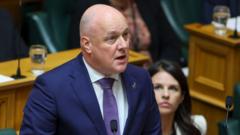Article:
New Zealand's Prime Minister Christopher Luxon has made an emotional apology to victims of abuse in care homes during an address in Parliament, following a troubling inquiry that has rocked the nation. This historic moment, which addressed one of the most significant abuse scandals in the country, brought to light that approximately 200,000 children and vulnerable adults were subjected to maltreatment in both state and religious institutions between 1950 and 2019.
Many of the most affected individuals included those from Māori and Pacific Islander backgrounds, as well as people living with mental and physical disabilities. The inquiry, described by Luxon as New Zealand's largest and most complex public investigation, lasted six years, featuring testimonies from over 2,300 survivors who bravely shared their traumatic experiences.
Luxon's apology came with a stark acknowledgment of the horrific nature of the abuses detailed in the inquiry's findings, which included acts such as rape, sterilization, and forced labor. The Prime Minister stated, “It was horrific. It was heartbreaking. It was wrong. And it should never have happened.” He emphasized the lasting impact these abuses had on survivors' lives, claiming that the government must be held accountable.
The inquiry's revelations indicated that faith-based institutions frequently documented higher rates of sexual abuse than their state counterparts. It also pointed out how both civil and religious leaders often attempted to shield abusers by relocating them and denying responsibility. Tragically, many victims passed away without ever receiving justice for their suffering.
Survivors and their advocates attended the session, while many more viewed the apology through live streams across the nation. Some critics noted that giving the apology from Parliament limited access for many survivors to hear Luxon's words directly. Survivors have expressed skepticism around the apology, advocating that it must lead to actionable restitution to be meaningful. Tupua Urlich, a Māori survivor who shared his harrowing story during the inquiry, stressed, "These words are nothing unless they're followed by action, and the right kind of action that is informed by survivors."
The government has been slow to outline a restitution scheme for the victims, with specific plans not expected until early next year. However, Luxon did announce an infusion of NZ$32 million ($19 million) into the current support system while working on creating a new financial redress mechanism for survivors. The inquiry's findings included over 100 recommendations aimed at reforming the care system, with the government reportedly working on 28 of these suggestions, although specific progress details remain vague.
As part of their reform efforts, a proposed bill to better protect vulnerable children in care homes aims to ban strip searches and impose stricter regulations on individuals working with minors. Additionally, Luxon declared a National Remembrance Day, scheduled for November 12 next year, to honor the victims and ensure the commitment to preventing such abuses in the future.
"It is on all of us to do all we can to ensure that abuse that should never have been accepted no longer occurs,” Luxon concluded, appealing to the nation to work collectively towards a safer future for the vulnerable.
New Zealand's Prime Minister Christopher Luxon has made an emotional apology to victims of abuse in care homes during an address in Parliament, following a troubling inquiry that has rocked the nation. This historic moment, which addressed one of the most significant abuse scandals in the country, brought to light that approximately 200,000 children and vulnerable adults were subjected to maltreatment in both state and religious institutions between 1950 and 2019.
Many of the most affected individuals included those from Māori and Pacific Islander backgrounds, as well as people living with mental and physical disabilities. The inquiry, described by Luxon as New Zealand's largest and most complex public investigation, lasted six years, featuring testimonies from over 2,300 survivors who bravely shared their traumatic experiences.
Luxon's apology came with a stark acknowledgment of the horrific nature of the abuses detailed in the inquiry's findings, which included acts such as rape, sterilization, and forced labor. The Prime Minister stated, “It was horrific. It was heartbreaking. It was wrong. And it should never have happened.” He emphasized the lasting impact these abuses had on survivors' lives, claiming that the government must be held accountable.
The inquiry's revelations indicated that faith-based institutions frequently documented higher rates of sexual abuse than their state counterparts. It also pointed out how both civil and religious leaders often attempted to shield abusers by relocating them and denying responsibility. Tragically, many victims passed away without ever receiving justice for their suffering.
Survivors and their advocates attended the session, while many more viewed the apology through live streams across the nation. Some critics noted that giving the apology from Parliament limited access for many survivors to hear Luxon's words directly. Survivors have expressed skepticism around the apology, advocating that it must lead to actionable restitution to be meaningful. Tupua Urlich, a Māori survivor who shared his harrowing story during the inquiry, stressed, "These words are nothing unless they're followed by action, and the right kind of action that is informed by survivors."
The government has been slow to outline a restitution scheme for the victims, with specific plans not expected until early next year. However, Luxon did announce an infusion of NZ$32 million ($19 million) into the current support system while working on creating a new financial redress mechanism for survivors. The inquiry's findings included over 100 recommendations aimed at reforming the care system, with the government reportedly working on 28 of these suggestions, although specific progress details remain vague.
As part of their reform efforts, a proposed bill to better protect vulnerable children in care homes aims to ban strip searches and impose stricter regulations on individuals working with minors. Additionally, Luxon declared a National Remembrance Day, scheduled for November 12 next year, to honor the victims and ensure the commitment to preventing such abuses in the future.
"It is on all of us to do all we can to ensure that abuse that should never have been accepted no longer occurs,” Luxon concluded, appealing to the nation to work collectively towards a safer future for the vulnerable.





















